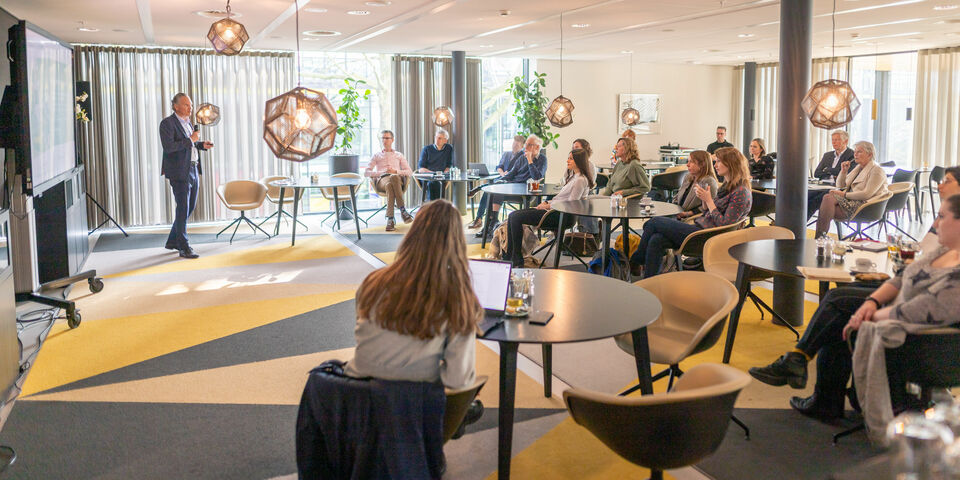Discussing the future of TU/e
The Executive Board organized a so-called Mid Term Review in the University Club on Wednesday morning during which the board entered into a dialogue with employees about its policy. The Institutional Plan 2020-2025 was the topic of discussion. President Robert-Jan Smits asked the participants whether they felt that there is something still missing at this point from the 17 priorities outlined in the plan, and whether they notice any new trends. Many of the topics are related to work pressure.
Robert-Jan Smits opens the round table discussion with the remark that the document that will serve as a guideline was written before COVID-19 hit the world. This means that a substantial update will be required, with special emphasis on sustainability and digitalization, as far as Smits is concerned.
TU/e’s 17 policy priorities have been grouped into three pillars: talent, collaboration and resilience. Smits asks the attendees what they believe came to fruition, and what hasn’t so far. He goes ahead and shares his own thoughts. “We still have work to do on the roadmap for Research infrastructure, with cleanrooms and microscopes, for example.”
Several issues are brought up, including wellbeing, internal communication, recognition for the support staff, and the word excellence. Somehow, the discussion always turns to work pressure, which is too high. Smits gives his fellow administrators Nicole Ummelen and Frank Baaijens the opportunity to answer the questions people have.
“Give us your vision,” Pim van der Hoorn (assistant professor at Mathematics and Computer Science) says. “I don’t see a specific vision on the implementation of the Recognition and Rewards program anywhere in the plans. Share your vision, that will give people more clearly defined tasks, and it will also improve support for staff members.”
Work pressure
Professor Niels Deen (Mechanical Engineering) asks the Executive Board to give people tasks that they’re good at. He mentions the introduction of TU/e InSite as an example, which practically turned him and his colleagues into parttime HR employees.
Smits reassures Deen and tells him that SQUAD will optimize the services, so that everyone can focus on his or her own work. Nicole Ummelen, who is in charge of this Support Quality Drive, adds: “We want to ensure that everyone does the work they’re good at. Now that we will be implementing a new financial system, we will take into account the lessons learned from TU/ InSite.”
Optimization
Patricia Veling, student counselor at ESA, draws attention to the university’s international students. “These young people need a customized approach for their personal problems. That conflicts with the optimization of processes. Don’t forget that the number of students has doubled over the past seven years, whereas the number of ESA employees has lagged behind dramatically.”
Professor of Energy Technology Rick de Lange also draws attention to work pressure. Smits explains that the academic world itself is partly to blame for this. “The pressure to publish doesn’t come from me. Go set up vacancies and fill these in.” Baaijens says that hybrid teachers will need to be deployed as well. “In Strategy 2030, we thought that TU/e could grow to 15,000 students. But with the current student-staff ratio, we need to limit that number to 13,000.” De Lange insists: “The focus on excellence limits us in who we can recruit. We could also use people who aren’t in the top-tier category.”
Even though turnout was somewhat disappointing to Smits – only fourteen people showed an interest – the meeting yielded input right to the end for the Executive Board to consider.
There are more sessions to come on March 31, April 1 and April 6. Sign up here.


Discussion